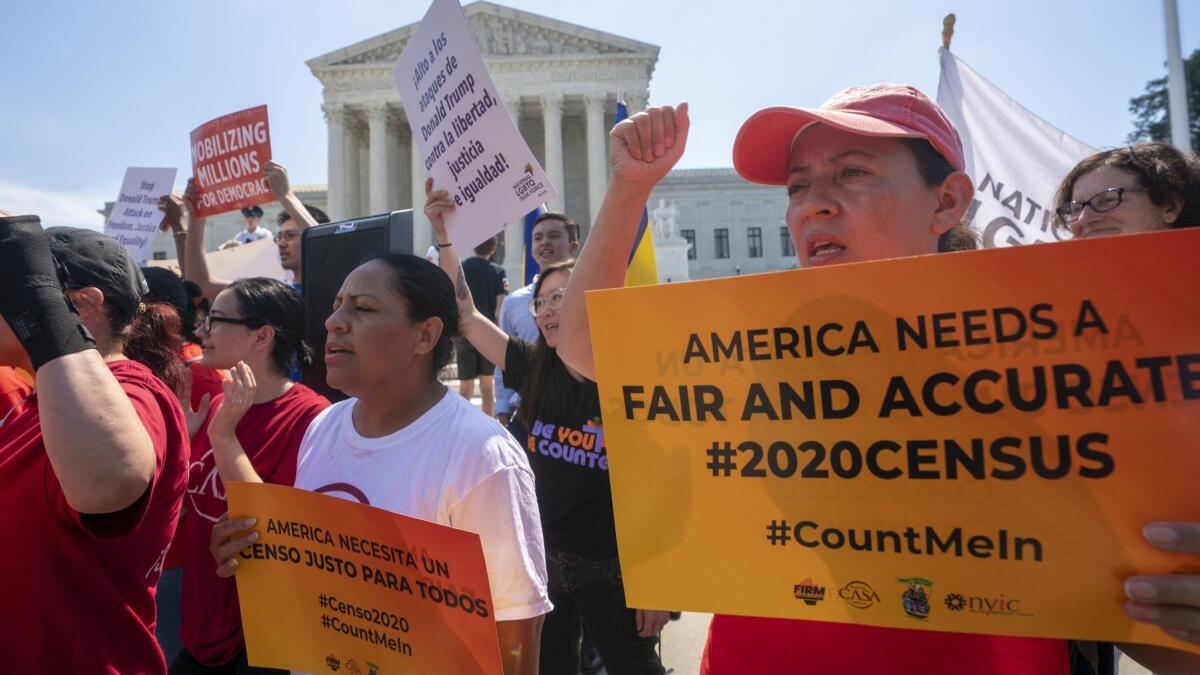Editorial: The Supreme Court left the door wide open for Trump to try again on census citizenship

- Share via
A majority of the members of the U.S. Supreme Court on Thursday saw the justification offered by Commerce Secretary Wilbur Ross for adding a citizenship question to the 2020 census for exactly what it was: a lie, though the court was more delicate in its terminology.
Ross has said repeatedly that government needs to ask people about their citizenship in order to determine how many noncitizens there are in the country. That information, he has said, is essential to better enforcement of the federal Voting Rights Act.
But that’s disingenuous. In fact, Ross and his allies in the Trump administration hoped that the question would lead to depressed Latino participation in the census, an undercount of millions of people, a reduction in Democratic representation in the next reapportionment and diminished federal spending to Democratic parts of the country by billions of dollars.
Unfortunately, the court left the door open for the Commerce Department to go back to court to get its story right and try again. But here’s a better idea: Commerce should abandon this cynical charade altogether and get on with the task of preparing for the most accurate national head count possible.
The court left the door open for the Commerce Department to go back to court to get its story right and try again.
The court held that the Commerce secretary has the authority to add questions to the census, and that Ross was within his power to make an executive decision on the citizenship question based on proposals and scenarios presented to him by department experts. In this case, according to the decision, the Commerce Department’s argument was that it had to weigh “the benefit of collecting more complete and accurate citizenship data against the risk that inquiring about citizenship would depress census response rates.” That seems reasonable enough — on the surface. But as Chief Justice John Roberts pointed out in his majority decision, Ross had decided within weeks of joining the government that he wanted the question added and then foraged around for a justification. And then, to put it politely, Ross dissembled. “Altogether,” Roberts wrote, “the evidence tells a story that does not match the explanation the secretary gave for his decision.”
So the Trump administration lied, which is neither new nor earth-shattering. And Trump responded Thursday to the court’s decision in predictably Trumpian fashion. “Seems totally ridiculous that our government, and indeed Country, cannot ask a basic question of Citizenship in a very expensive, detailed and important Census, in this case for 2020,” Trump tweeted. He then went on to say he’s going to try to delay the census, which has been held every 10 years on April 1 since 1930. The notion that such a vital enumeration should be delayed because our pouting president didn’t get his way is preposterous.
As it is, Thursday’s decision lets the government try to concoct another rationale for asking the question, though it ultimately will have to get that reasoning through the courts. The paper trail of Ross’ contrived argument will be hard to overcome, especially as the days tick by. The administration has said that it needs a final answer by July 1 to start printing census forms and have them ready in time for next year’s count, but a government witness testified that the questionnaire could be finalized as late as Oct. 31.
There are also documents from a separate legal challenge suggesting that the idea for the question might have come from longtime Republican strategist Thomas B. Hofeller. When he died last year, his estranged daughter found a 2015 report he had written arguing that adding the question would tilt ensuing redistricting fights in the favor of Republicans, and that the Voting Rights Act should be used as a pretext.
Enter the Fray: First takes on the news of the minute »
There’s a lot of political gamesmanship here. But the cold truth is that adding the citizenship question is bad policy. It will undoubtedly lead to undercounts in immigrant communities already distrustful of the federal government, due in no small part to the president’s rhetoric and action against illegal immigration. The information the government says it hopes to glean from the question is available already through the smaller American Community Survey, also conducted by the Census Bureau. And activists who file lawsuits over discriminatory voting laws and practices say they don’t need the data to wage those fights.
The only reason to include the question, it seems, is to further erode democracy by reducing legislative representation for immigrant communities, tipping that balance to whiter, less urbanized areas, and reducing levels of federal aid where it is needed. The government should listen to its own census experts, not Trump’s political hacks, and back off.
Follow the Opinion section on Twitter @latimesopinion or Facebook
More to Read
A cure for the common opinion
Get thought-provoking perspectives with our weekly newsletter.
You may occasionally receive promotional content from the Los Angeles Times.










